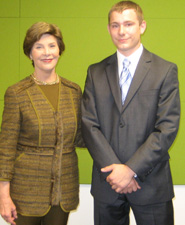This winter, Colton Kennedy, a junior in mechanical engineering, will travel to India to implement a proposal he submitted for the Laura W. Bush Traveling Fellowship. The fellowship provides funding for a student-developed proposal to work abroad while fulfilling the mandate of the United Nations Education, Science, and Cultural Organization (UNESCO).
While in India, Colton will be working with multiple not-for-profit organizations in the development of appropriate rural technologies and communication materials. He hopes to share his experience with other college students interested in these technologies through the creation of non-profit organization and a project website.
Former First Lady Laura Bush presented Kennedy the award at the United Nations Building in New York City on September 8. He was one of only three students nationwide to receive the award.
Recipients for the fellowship are selected based on the originality and feasibility of a project proposal, the quality of their essay, and their dedication to connecting with other nations and cultures while promoting democracy throughout the world.
Kennedy’s project, titled “Technology Granted Freedom (TGF),” will allow him to develop Appropriate Rural Technology (ART) in India while informing engineering and technical university students of design constraints, key issues, and impediments with the development of this sort of technology. ART, as Kennedy explained, is “technology which is both culturally-relevant and sustainable for its area of application, in regards to environmental, social, and economic context.
“The ultimate goal of TGF is to improve the quality of life for those rural and impoverished peoples around the world deprived of technology appropriate for their location and condition,” Kennedy said.
Another goal of the project is to facilitate the sharing of information and experience with this type of technology. “The goal of the project is to develop a networking infrastructure between students and professionals,” Kennedy said.
Kennedy secured the assistance of the Institute for Rural Research and Development in Dehli, India. He will also be working with the Appropriate Rural Technology Institute located in Pune, India.
Additional funding for the project was provided by Kennedy’s internship. “Through remarkable generosity, my friends at Pegasus-Global have offered funding to ‘make it happen,’ through the Patricia D. Galloway and Kris R. Nielsen Foundation,” he said.
While working at his summer internship at Pegasus Global Holdings, Inc., Kennedy was encouraged to develop and finalize his proposal.
“While working at Pegasus, I developed a close friendship with the President, CEO, and COO. These three individuals greatly encouraged my proposal. It was the CEO, Dr. Patricia Galloway, who introduced me to the award and helped me make the contacts necessary to develop the proposal.”
Kennedy also had support from Iowa State Executive Vice President and Provost Elizabeth Hoffman, College of Engineering Dean Jonathan Wickert, and Ramesh Kanwar, chair of the agricultural and biosystems engineering department. “Without these individuals, and the connections they supplied, I never would have been able to develop a successful proposal,” said Kennedy.
In pursuit of these ambitious goals, Kennedy is working with other like-minded students at Iowa State. “I hope to create something that involves a variety of individuals and has the ability to continue after I have left,” said Kennedy. In particular, Kennedy is working with Brian Castro, a sophomore in Global Resource Systems. “I am lucky to share this experience with a friend like [Castro]. He has become valuable asset to the project, and I am very grateful that we have students like him on our campus,” said Kennedy.
After the travel abroad experience, Kennedy will submit a report describing his experiences and analyzing the success of the objectives which he outlined in his project proposal.
